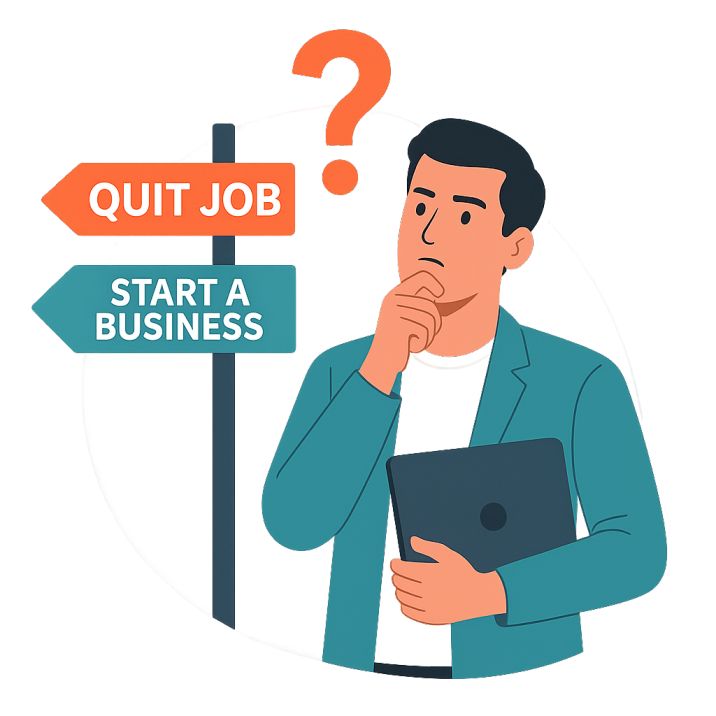Ever found yourself staring at your office ceiling fan, wondering, “What if I just quit and started my own thing?” If you’ve ever had the itch to leave the 9-to-5 life and start your own business, you’re not alone. But is it a dream worth chasing now, or a recipe for regret?
Welcome to the great dilemma: Job vs Business. Quitting a steady job to pursue a passion project is exciting, terrifying, and, honestly, kind of confusing. So before you hand in your resignation letter or fire up your startup Instagram page, let’s talk about the real stuff.
1. Ask Yourself: Why Do You Want to Start a Business?
It’s tempting to say goodbye to the corporate grind when your boss annoys you or Monday mornings feel like climbing Mount Everest barefoot. But emotional decisions rarely end well.
Be brutally honest with yourself:
- Is it passion, or frustration?
- Do you want freedom, or are you just bored?
- Are you trying to build something, or running from something?
Pro tip: Write down your reasons. If most of them are negative (like “I hate my boss”), maybe it’s not the right time. If it’s because you’ve got a clear vision, burning passion, and a marketable idea—now we’re talking!
2. Do You Have a Business Idea or Just a Dream?
Loving fashion doesn’t mean you’re ready to launch a clothing line. Watching Shark Tank doesn’t make you an entrepreneur. You need more than enthusiasm—you need a plan.
Ask yourself:
- What problem does my business solve?
- Who are my customers?
- How will I make money?
If your idea still sounds good after asking these hard questions, you’re off to a solid start.
3. Start Small Before You Leap
You don’t have to quit your job tomorrow to become an entrepreneur. The smartest move? Start your business as a side hustle.
Test your idea in the real world:
- Sell on weekends or evenings.
- Freelance while keeping your full-time job.
- Use holidays and leaves to validate your product or service.
If your side gig starts to earn consistently and gains traction, you’ll know when it’s time to go full-time. It’s not sexy, but it’s smart.
4. How’s Your Financial Cushion?
Let’s get real: business takes time to become profitable. You won’t be sipping coffee in Bali and counting lakhs in your bank account on Day 10.
Before quitting your job, ask:
- Do I have at least 6–12 months’ worth of living expenses saved?
- Can I handle zero income for a while?
- Do I understand how much my business needs to survive in Year 1?
Create a simple Excel sheet with all your monthly expenses. Be honest about your Netflix subscription, Swiggy habits, and weekend trips. If you can survive without a salary, the risk becomes more manageable.
5. What’s Your Risk Appetite?
Let’s not sugarcoat it—entrepreneurship is risky. There are no guaranteed paychecks, no fixed promotions, and no HR to complain to when the Wi-Fi doesn’t work.
Ask yourself:
- How do I handle uncertainty?
- Am I okay with failure?
- Can I stay motivated without external validation?
Some people thrive under pressure. Others crumble. Knowing which one you are can save you a lot of heartache.
6. Family Pressure is Real. Have the Talk.
Let’s not ignore the elephant in the Indian living room—family expectations.
Will your parents understand why you left a stable job with health insurance to sell handmade candles or start an app?
Here’s what you do:
- Explain your plan, not just your dream.
- Show them numbers, timelines, and potential outcomes.
- Be open to their concerns but stand firm if you truly believe in your path.
Confidence, not rebellion, will win their support.
7. Build a Network Before You Need One
Quitting your job is lonely if you don’t have the right people around you. Before you leave:
- Attend startup meetups and business networking events.
- Join LinkedIn groups or WhatsApp communities.
- Find a mentor who’s been through the journey.
Your network can introduce you to clients, investors, collaborators, and—most importantly—give you perspective.
8. What Skills Will You Need to Succeed?
Running a business means wearing all the hats: marketer, accountant, operations manager, and even delivery person at times.
Ask yourself:
- Do I know how to market a product online?
- Can I manage basic accounting and cash flow?
- Am I ready to learn and upskill constantly?
You don’t need to be a master at everything, but a solid understanding is crucial. YouTube, Coursera, and even Instagram are your new classrooms.
9. Test Your Business Idea with Real People
Before you say goodbye to your salary:
- Build a simple website.
- Offer a product sample.
- Ask for feedback from real users (not just your friends or mom).
If strangers are willing to pay for it, you’re onto something. If not, tweak your idea or go back to the drawing board. No harm done.
10. The Mental Game: Are You Ready?
Entrepreneurship is as much about mindset as it is about the product. There will be late nights, failed campaigns, zero sales days, and moments of self-doubt.
Prepare mentally:
- Build daily routines and habits.
- Stay active and eat well (no, chai and Maggi don’t count).
- Practice patience. Success takes time.
Find joy in the process, not just the outcome.
Final Thoughts: Quit Smart, Not Fast
Should you quit your job to start a business? The answer isn’t black and white. It depends on your financial situation, your mindset, your plan, and your willingness to embrace chaos with courage.
Here’s a golden rule:
Don’t quit your job to escape something. Quit it to build something.
Your career is your responsibility—own it like a boss, whether you’re salaried or self-employed.

